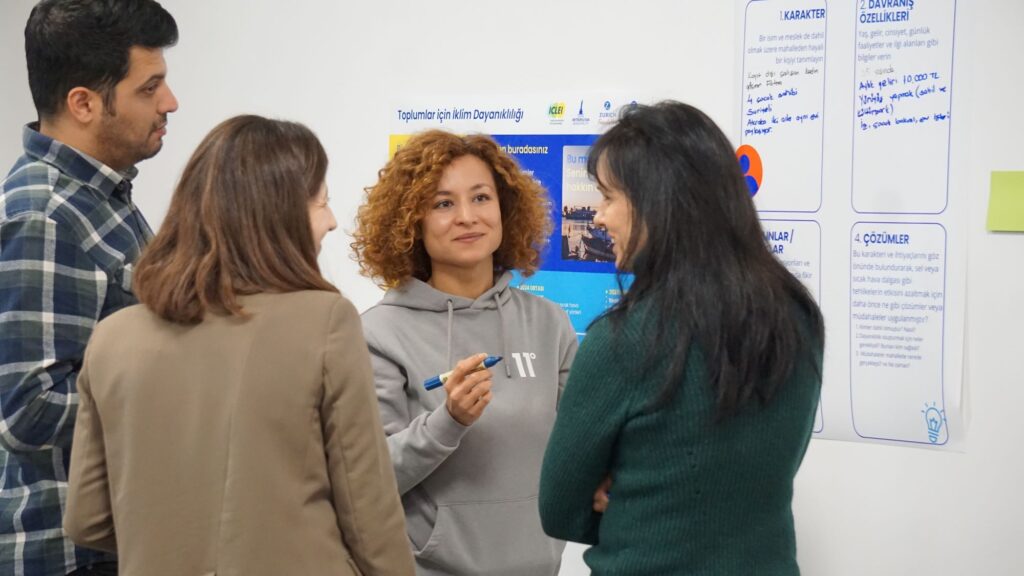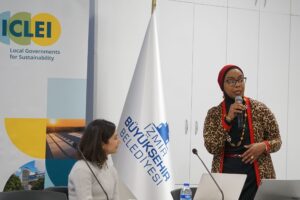Building climate resilience with local communities: Insights from Izmir
Climate adaptation is most impactful when it centers the lived experiences of local communities – addressing the real impacts of a changing climate and ensuring that most vulnerable people are aware of actions being taken in their neighborhoods. In Türkiye, one of the most hazard-exposed countries worldwide according to the Intergovernmental Panel on Climate Change, building climate resilience is at the center of new discussions that have engaged a wide range of local residents, nonprofits, municipal employees and experts, and business owners.
This sentiment is a cornerstone of the Climate Resilience for Communities (CRC) project taking place in Izmir, Türkiye. In pursuit of community-based resilience solutions, ICLEI, the Izmir Metropolitan Municipality, the Z Zurich Foundation, and Zurich Insurance Group Türkiye are working together with selected communities to help them better understand their climate risks and assess how well these neighborhoods can cope with and recover from severe climate impacts, particularly flooding and extreme heat events.
Building trust and fostering ownership among residents
Some innovative workshops, for instance, have already sparked conversations with the locals about the vulnerability to climate hazards of the Pazaryeri neighborhood in Izmir’s Konak District. The lively neighborhood is home to many historic sites like the Namazagh Hamami, yet highly exposed to climate-related hazards like flooding and non-climate hazards like earthquakes.
Part of what made these workshops successful was in the mix of engagement styles: From smaller discussion groups with women and residents with immigration backgrounds; to interviews with business owners; to one-on-one street-level conversations with elected representatives known as ‘muhtars’. Accessible, non-technical language and informal chats were used during these different touch points, conducted in Turkish, English, Arabic and French languages. This helped build trust with key local actors, and provided the space for project partners to better express their climate vulnerabilities, with a broad scope of understanding the project overall scope and expected outcomes.
In the words of Nuha Eltinay, ICLEI Europe’s senior expert on urban resilience and climate adaptation, “engaging local communities is not just about gathering data; it’s about building trust and fostering a sense of ownership among residents. When people see that their voices are heard and their insights are valued, they become active participants in the resilience-building process.”
The three-day workshop served as an excellent example of effective community engagement within the CRC project. On day one, stakeholders from municipal departments, academia, NGOs, and professional associations participated in exercises focused on climate hazard and community vulnerability mapping. There, participants made clear that gaps in climate adaptation actions are strongly associated with the lack of disaggregated data on climate risks and accessibility to early warning systems at the neighborhood level, Additionally, they highlighted the need to integrate Nature Based Solutions into strategic urban plans, such as having more permeable surfaces and investments in green infrastructure.
The second day broadened this perspective with interviews conducted with local business owners, focus groups with Muhtars (community and government representatives), women living in the Pazaryeri neighborhood, as well as different refugee groups and children. These groups took part in facilitated discussions detailing their experiences in making their homes safer to withstand flood and heat climate hazards. These conversations helped project partners to have a better understanding of how people in different parts of Izmir currently experience and deal with climate hazards, highlighting the need to develop more inclusive mechanisms to help the most vulnerable build their resilience and climate adaptation mechanisms.
On day three, site visits took place to explore the most vulnerable areas indicated by local communities and help define the CRC study boundaries. First, project partners engaged with female farmers during their training on income generation via urban gardens, which are designed for tackling flash floods and heat waves by growing agricultural products. Following, they had a closer look at the different sites’ spatial characters as they walked through, mapping important neighborhood assets like community centers, public spaces, and community gardens.

These engagements had two main benefits. On the one hand, they gathered insights, daily challenges, and lived experiences of a diverse array of residents and stakeholders to be reflected in further steps of the project. On the other hand, they connected first-hand project partners and the local communities they will work with, covering a diverse range of gender identities, socioeconomic backgrounds, and levels of expertise on climate change.
The journey towards climate resilience in Izmir highlights the critical role of collaboration between local communities, organizations, and international partners. Through the CRC project, we have seen firsthand how inclusive engagement and shared expertise can lead to meaningful, sustainable, inclusive, and impactful change. As we move forward, it is clear that such partnerships are not just beneficial but essential in tackling cities’ complex human centered challenges posed by climate change beyond physical urban characteristics.
About the Climate Resilience for Communities project
The Climate Resilience for Communities project in Izmir, part of the Urban Climate Resilience Program led by the Z Zurich Foundation, aims to support vulnerable neighborhoods in facing climate-related and non-climate hazards. Implemented by ICLEI, the Izmir Metropolitan Municipality, Z Zurich Foundation, and Zurich Insurance Group Türkiye, the project uses the Climate Resilience Measurement for Communities (CRMC) tool to assess and improve the neighborhoods’ ability to cope with climate impacts. It involves local communities in creating resilience plans, monitors the effectiveness of solutions, builds residents’ skills, and promotes learning and resource sharing within and beyond the city.
This blog was written by Matteo Bizzotto and Katherine Peinhardt, Senior Communication Experts at the ICLEI World Secretariat and European Secretariat, respectively, and Nuha Eltinay, Senior Expert in Urban Resilience and Climate Adaptation and Project Manager.







